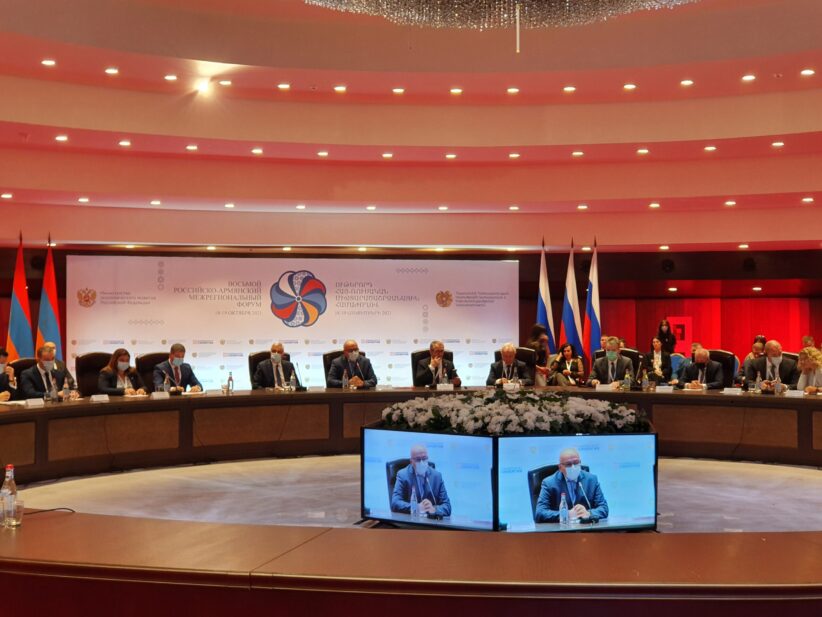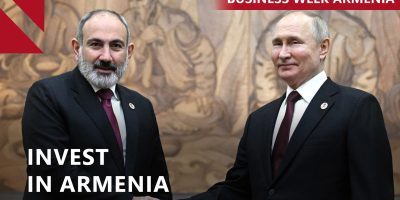By Mark Dovich
Last Tuesday, Russia’s economic development minister, Maxim Reshetnikov, announced that the Russian government is planning to pour $1 billion in investments into Armenia in the next few years.
“Armenia is a most important strategic partner for Russia,” he said. “In the coming years, Russian companies plan to invest over $1 billion in Armenia’s economy.”
Dmitry Volvach, a deputy minister at Russia’s Economic Development Ministry, confirmed that figure the same day to reporters on the sidelines of the Armenian-Russian Interregional Forum in Yerevan. The forum is co-sponsored by the Russian Economic Development Ministry and the Armenian Ministry of Territorial Administration and Infrastructure.
Volvach, who oversees departments at the ministry charged with Eurasian integration and projects in post-Soviet countries, noted that “our mutual trade is recovering quite well — a 17% growth in 2021. This is despite the fact that it fell by almost 4% in the pandemic year.”
“According to statistics, currently, Russian investments account for 40% of foreign investments in the Republic of Armenia. It seems to me that it is quite logical at least to maintain this share,” he said.
Volvach added that the $1 billion in investments will be dedicated mainly to the energy, transport, and infrastructure sectors.
Armenian Prime Minister Nikol Pashinyan underlined Russia’s outsized role in Armenia’s economy in an address to forum attendees, saying that “the Russian Federation not only plays a key role in maintaining peace and stability in our region but also occupies a central place in our country’s economy.”
Indeed, nearly three decades on from the Soviet Union’s collapse, Armenia’s economy remains overwhelmingly dependent on Russia’s.
“We need to improve our economic relations in a way that will foster the development of competitive industries in our countries,” Pashinyan said. “In this context, we regard as important further mutual integration of our economies, which must be based on a free movement of goods, services, labor and capital. The Eurasian Economic Union serves this strategic goal.”
Armenia has been a member of the Eurasian Economic Union, a Russia-led economic grouping that unites five post-Soviet countries in an integrated single market, since 2015.
Among the Armenian and Russian government officials and businesspeople gathered at the forum was Samvel Karapetyan, an Armenian-Russian billionaire who owns the Tashir Group, a holding of over 200 companies, mainly active in real estate ventures across Armenia and Russia.
At the forum, Karapetyan said that Tashir would invest up to $600 million in the Armenian energy sector in the near future. The group already controls Armenia’s electricity distribution network and owns key thermal power plants and hydroelectric complexes in Armenia.
Despite all the talk about investment, an analyst who spoke with CivilNet expressed doubts about the nature and amount of economic assistance Russia is actually willing to provide Armenia.
“Frankly speaking, I have a feeling that this is more some Russian PR than actual investment, because as far as I understand, the Russian economic situation is not very good,” said Benyamin Poghosyan, chairman of the Yerevan-based Center for Political and Strategic Studies.
He also underscored the lack of clarity about what the investment plan actually entails: “What do these investments mean? Are they state investments? If there is some private investment, who are these companies?”
According to Poghosyan, the intent behind the announcement of a $1 billion investment program for Armenia is an attempt by Russia to shore up its worsening image among many Armenians.
“Russia understands that its image was damaged, and there is quite a growing anti-Russian feeling in Armenia, because many in Armenia believe the war itself was a result of some sort of Russia-Turkey understanding,” he said.
The real signal of Russia’s willingness to help Armenia economically, Poghosyan said, will be in the result of ongoing negotiations between the Armenian government and Gazprom over gas prices in Armenia. Gazprom is the Russian government-owned natural gas company.
“Armenia is buying based on a long-term contract, but this contract will expire in December 2021. So for me, the key indicator of any Russian economic support to Armenia will be the gas price for Armenia starting from 2022,” he said.
Armenia currently pays $165 per thousand cubic meters of Russian natural gas, far below the prices many other countries pay. Still, the price of natural gas in Armenia has long been a source of political contention in the country. For its part, Russia has long used discounted natural gas supplies as a key lever of economic control over its post-Soviet neighbors.
Gazprom is the exclusive supplier of Armenia’s natural gas and last year provided more than 2 billion cubic meters of gas to Armenia via neighboring Georgia. The company is also Armenia’s second largest taxpayer, according to the Armenian State Revenue Committee, and paid over $90 million in taxes to the Armenian government in 2020 alone.
Read more: Armenia, Russia continue gas price negotiations, with outcome still unclear
















